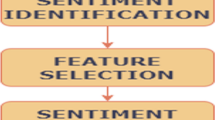Abstract
Sentiment analysis has emerged as a prominent and critical research area, particularly in the realm of social media platforms. Among these platforms, Twitter stands out as a significant channel where users freely express opinions and emotions on diverse topics, making it a goldmine for understanding public sentiment. The study presented in this paper delves into the profound significance of sentiment analysis within the context of Twitter, with a primary focus on uncovering the underlying sentiments and attitudes of users towards various subjects. To achieve it, this study presents a comprehensive analysis of sentiment on Twitter, leveraging a diverse range of advanced deep learning and neural network models, including Convolutional Neural Network (CNN) and Recurrent Neural Network (RNN). Moreover, investigates the effectiveness of Hybrid Ensemble Models in enhancing sentiment analysis accuracy and optimized time. The proposed architecture (HCCRNN) puts forward a sophisticated deep learning model for sentiment analysis on Twitter data, achieves great accuracy whilst considering computational efficiency. Standard models such as Multinomial-NB, CNN, RNN, RNN-LSTM, and RNN-CNN, as well as hybrid models such as HCCRNN (2CNN-1LSTM), CATBOOST, and STACKING (RF-GBC), were examined CNN and RNN-CNN had the best accuracy (82%) and F1-score (81%), with appropriate precision and recall rates among the conventional models. RNN-CNN surpassed other models in terms of analysis time, requiring just 22.4 min. For hybrid models, our suggested model, HCCRNN (2CNN-1LSTM), attained high accuracy in 59 s and an accuracy of 82.6%. It exhibits the capability of real-time sentiment analysis with extraordinary precision and efficiency. This comprehensive exploration of sentiment analysis on Twitter enriches the knowledge base of the community and the application of sentiment analysis across diverse domains.
Access this chapter
Tax calculation will be finalised at checkout
Purchases are for personal use only
Similar content being viewed by others
References
Gupta, S., Chopra, C.: Impact Of Social Media On Consumer Behaviour (2020). https://doi.org/10.13140/RG.2.2.26927.15527
Brown, L., Williams, E.: Analyzing user-generated content: opportunities and challenges. In: Proceedings of the International Conference on Natural Language Processing, pp. 45–58 (2020)
Liu, B.: Sentiment analysis and opinion mining. Synth. Lect. Hum. Lang. Technol. 5(1), 1–167 (2012). https://doi.org/10.2200/S00416ED1V01Y201204HLT016
Pang, B., Lee, L.: Opinion mining and sentiment analysis. Found. Trends® Inf. Retr. 2(12), 1–135 (2008). https://doi.org/10.1561/1500000011
Go, A., Bhayani, R., Huang, L.: Twitter sentiment classification using distant supervision. CS224N Project Report, Stanford 1, p. 12 (2009)
Pak, A., Paroubek, P.: Twitter as a corpus for sentiment analysis and opinion mining. In: Proceedings of the International Conference on Language Resources and Evaluation, pp. 1320–1326 (2010)
Zhang, Y., Zhang, L., Chen, H.: Sentence-level sentiment classification with convolutional neural networks. In: Proceedings of the 56th Annual Meeting of the Association for Computational Linguistics (Volume 1: Long Papers), pp. 1–10 (2018)
Wang, Y., Huang, M., Zhu, X., Zhao, L., Zhang, X.: Attention-based stacked ensemble for twitter sentiment classification. In: Proceedings of the 56th Annual Meeting of the Association for Computational Linguistics (Volume 2: Short Papers), pp. 231–236 (2018)
Dos Santos, C., Gatti, M.: Deep convolutional neural networks for sentiment analysis of short texts. In: Proceedings of COLING 2014, the 25th International Conference on Computational Linguistics: Technical Papers, pp. 69–78 (2014)
Dhanya, N.M., Harish, U.C.: Sentiment analysis of twitter data on demonetization using machine learning techniques. In: Hemanth, D.J., Smys, S. (eds.) Computational Vision and Bio Inspired Computing. LNCVB, vol. 28, pp. 227–237. Springer, Cham (2018). https://doi.org/10.1007/978-3-319-71767-8_19
Kartik, P.V.S.M.S., Jeyakumar, G.: A Deep learning based system to predict the noise (disturbance) in audio files. In: Proceedings of 3rd International Conference on Emerging Current Trends in Computing and Expert Technologies (COMET-2020). Advances in Parallel Computing, Intelligent System and Computer Technology, Chennai, vol. 37, pp. 154–160. COMET-2020 (2020)
Uthayasuriyan, A., Chandran, G.H., Kavvin, U., Mahitha, S.H., Jeyakumar, G.: Influence maximization models in social networks: a comparative analysis. In: 2023 International Conference on Advancement in Computation & Computer Technologies (InCACCT), Gharuan, India, pp. 1–5. IEEE (2023). https://doi.org/10.1109/InCACCT57535.2023.10141772
Nair, A.J., Veena, G., Vinayak, A.: Comparative study of twitter sentiment on COVID - 19 tweets. In: 2021 5th International Conference on Computing Methodologies and Communication (ICCMC), pp. 1773–1778 (2021). https://doi.org/10.1109/ICCMC51019.2021.9418320
Naveenkumar, K.S., Soman, K.P., Vinayakumar, R.: Amrita-CEN-Senti-DB: twitter dataset for sentimental analysis and application of classical machine learning and deep learning (2020). https://doi.org/10.36227/techrxiv.12058968
Author information
Authors and Affiliations
Corresponding author
Editor information
Editors and Affiliations
Rights and permissions
Copyright information
© 2024 The Author(s), under exclusive license to Springer Nature Switzerland AG
About this paper
Cite this paper
Ashok, G., Ruthvik, N., Jeyakumar, G. (2024). Optimizing Sentiment Analysis on Twitter: Leveraging Hybrid Deep Learning Models for Enhanced Efficiency. In: Devismes, S., Mandal, P.S., Saradhi, V.V., Prasad, B., Molla, A.R., Sharma, G. (eds) Distributed Computing and Intelligent Technology. ICDCIT 2024. Lecture Notes in Computer Science, vol 14501. Springer, Cham. https://doi.org/10.1007/978-3-031-50583-6_12
Download citation
DOI: https://doi.org/10.1007/978-3-031-50583-6_12
Published:
Publisher Name: Springer, Cham
Print ISBN: 978-3-031-50582-9
Online ISBN: 978-3-031-50583-6
eBook Packages: Computer ScienceComputer Science (R0)




